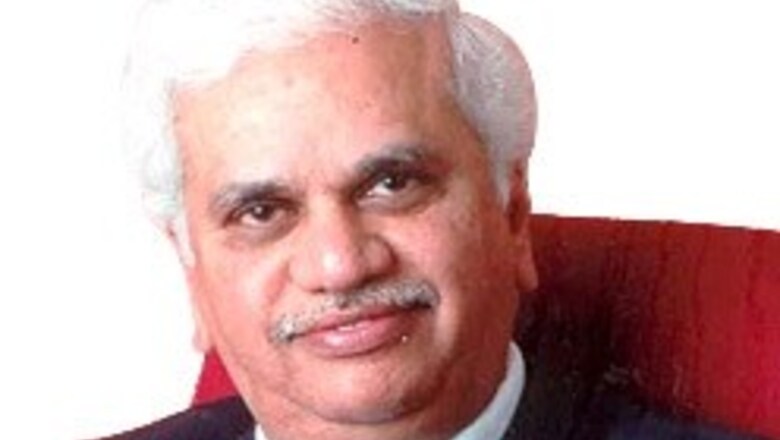
views
Finance Minister P Chidambaram will present the Union Budget on February 29. The presentation of the Budget is one of the most closely followed events in India as it affects almost every one in the country.
How Chidambaram is going to address the IT and healthcare sector this Budget? Will the Finance Minister play it safe this Budget keeping general elections in mind?
To find out all the answers, IBNLive.com organised an online chat with GK Muralikrishna CEO & MD of Helios & Matheson Information Technology Ltd.
Here we reproduce the full text of his chat.
Rose: With Indian healthcare services on a high, will the forthcoming Budget result in a healthcare-driven IT Industry as against the telecom and BFSI sectors of the IT industry?
GK Muralikrishna: While healthcare is growing well, BFSI and telecom will continue to be dominant in the near term.
Yar: Is India moving towards an IT-enabled healthcare service providing country for its citizens?
GK Muralikrishna: Definitely. Cases in point are Narayana Hridalaya and Aravind Eye Hospitals.
Yar: On a theoretical note, what kind of Budget will help India attain above 10 percent GDP in the coming year?
GK Muralikrishna: Besides investment in infrastructure, the skill development mission (that Veena just mentioned) will go a long way in sustaining and growing the GDP.
Manoj: Which small cities are KPO destinations? Are these cities on the radar from the POV of cost, infrastructure, transportation and stable political conditions – Indore, Jaipur, Jodhpur, Nagpur, Nasik, Aurangabad, Baroda, Surat, Coimbatore, Madurai, Bhopal, Jabalpur, Raipur, Bilaspur, Mohali?
GK Muralikrishna: As the industry grows, geographical spread is a natural progression.
Veena: The Union government is setting up a skill development mission in order to address the growing skills shortage in the country with an investment of Rs31,000 crore…Do you think it will make a difference?
GK Muralikrishna: Surely.
Jatin: Sir, a simple question to ask. If this current trend of IT depreciation continues, which will be the first industry to close --IT or BPO?
GK Muralikrishna: As per the NASSCOM-McKinsey study, IT and ITES are projected to grow rapidly in the next 2 years.
Anu: How will the IT sector 's growth be in the next 2 years?
GK Muralikrishna: It is expected to double in the next 2 years from US$ 32 billion to US$ 60 billion.
Kangana: Would you look at smaller healthcare delivery units or larger ones should you decide to sell to Indian hospitals?
GK Muralikrishna: We can commence with large chains of hospitals and progressively address the needs of smaller healthcare units.
Shreikanth: The IT Companies spend big money on training the trainees to make them deployable. Till then they are only an investment. Don’t you think that Government should give sops in such cases?
GK Muralikrishna: It's a welcome suggestion.
Yar: Hello sir, say if FM extends the STPI scheme this budget, how long do you want it to be extended?
GK Muralikrishna: Considering the market potential and competition in the global market, it may be extended for 5 to 10 years.
PAGE_BREAK
Ashis: What do you think are the key elements in providing IT-enabled healthcare facility to the end-users, apart from telemedicine?
GK Muralikrishna: We have one of the lowest cost per call in the world. The converse holds true for bandwidth. Further, bandwidth reach is restricted to only 20% of Indian population - 80% of India is untouched by current bandwidth. We need to address both reach and cost of bandwidth for telemedicine to truly take off.
Piyush: Indian IT firms are performing poor in the current scenario in terms of products? What is your view on this? Do you think IT hardware industry will do well in the coming year?
GK Muralikrishna: Response to Question 1: This question has agitated the NASSCOM and IT ministry. But the product business has 4 main challenges (a) investment in R&D (b) marketing and branding (c) technological obsolescence (d) protection of IP. India has historically been a capital starved economy and that has been a major reason for the economy taking some time to move into the product space, which is closely associated with the above risks. Response to Question 2: Demand for hardware is expected to grow exponentially with high growth in this sector. Employment generation will also be commensurate with this growth.
Kangana: Would you think of entering the Indian healthcare market with big companies like Cerner trying to hold a footing and having issues with implementation costs? Do you think you could provide HIT solutions with reducing costs to Indian customers?
GK Muralikrishna: Excellent suggestion, Kangana. HIT solutions for the domestic market is on the anvil. As the market matures, implementation costs will be in line with the value demonstrated.
Shreikanth: Will this be populist budget or financial budget
GK Muralikrishna: Please call me on Feb 29:)
Manoj: Do you think this year FM will increase tax benefits on medical insurance? Most of the companies have increased insurance premiums and especially for senior citizens, in this scenario the present benefits are not sufficient to motivate people to invest in insurance.
GK Muralikrishna: In India, insurance is being promoted more for investment than for healthcare security. Once it starts addressing a larger audience in an inclusive manner, the average cost would become more affordable.
Radha: What can India do to go up the value chain in the BPO space?
GK Muralikrishna: KPO space offers tremendous opportunity for moving up the value chain.
Srinit73: FBT is one important thing which is hitting the IT Companies badly. This I believe is derived from australian taxation. With dollar weakening and business getting more difficult the companies have to pay FBT for those who travel abroad . Tax on spending to me looks absurd. Your thoughts on this please
GK Muralikrishna: Some reliefs are expected in this budget regarding the FBT regime.
Radha: Should women IT workers be brought under a higher tax slab? Do you think it is fair?
GK Muralikrishna: I believe that there is no need for specific gender bias in taxation for women employees in IT. In general, IT companies are "equal opportunity" employers.
Sena: Most of the Indian students today going to towards IT industry.Do you recognize any other degree or business to aspire young student ?
PAGE_BREAK
GK Muralikrishna: The IT industry is employing more and more of chartered accountants, doctors, science graduates for domain expertise.
Rahul: What is there in FM's mind for SME sector this Budget, will this industry get some boost this Budget looking towards the last years' trend?
GK Muralikrishna: STPI benefits are expected to be extended for the SME sector in this budget.
Paul: GK, what is your comments about the abysmal performance of Indian IT firms on Product side? the big three are in service side for long and I feel they are wasting the tecnical capabilities of their employees by concentrating only on services?
GK Muralikrishna: This question is agitated by NASSCOM and IT ministry. But the product business has 4 main challenges (a) investment in R&D (b) marketing and branding (c) technological obsolescence (d) protection of IP. India has historically been a capital starved economy and that has been a major reason for the economy taking some time to move into the product spaces which is closely associated with the above risks. Even in the services space, there is a constant effort to move up the value chain. Services industry is successful in the face of international competition, benchmarking against the best in the world by leveraging the technical capabilities of the employees.
Radha: Which are the countries according to you which will give india a run for its money in outsourcing? what are the nations from which india faces a threat, especially in healthcare outsourcing?
GK Muralikrishna: India has domain expertise in several verticals and also early mover advantage. Most importantly, India has a phenomenally large base of knowledge workers. Setting up of more educational institutions and finishing schools will help the nation maintain its competitive edge over China, South-east Asia and East Europe.
Harish: How the information technology sector can benifit this Budget interms of hardware and software products. what lies for these industry this Budget.
GK Muralikrishna: Demand for hardware and software is expected to grow exponentially with high growth in this sector. Employment generation will also be commensurate with this growth.
Shreikanth: My question is into two parts Considering the fact that US is going on a slow down and IT industry people are hit with profitability do you think FM might anounce SOPs or extension of STP holiday period for IT Companies. Now that most companies are situated far off from the city and commuting is more costly with petrol costs very high. We are even now allowed only for 1400 Rs a month as sop will this be increased
GK Muralikrishna: As I already mentioned, considering that the IT industry is catering to the nation's priorities by earning valuable foreign exchange and providing direct and indirect employment to millions of people, the benefits of the STPI scheme should be extended. Prima facie, the positive externalities generated by the IT industry far outweigh the reliefs enjoyed by way of tax expemtions. Comfortable, shared transportation will be the answer to commuting long distances to the workplace.
PAGE_BREAK
Sundeep: what is the future of healthcare outsourcing in the country? Can India become a long-term destination? Or will this medical tourism last long?
GK Muralikrishna: Healthcare outsourcing is here to last. What we are witnessing currently is only the beginning. The next decade will see major action in this space.
Sena: Hello sir,After 10 years in india,what will have in IT industry ?Have any new industry will compete IT industry today like?
GK Muralikrishna: I believe that the other high growth industries are auto, auto ancillaries, infrastructure, construction and power, telecom. Name it, every other industry is growing rapidly in consonnance with economic growth.
Paul: Do you think that the sunset clause of STPI should be removed considering the fact that Public Resources are spent on infrastructure support for IT parks but no tax collected? Are S/W companies liable to implement reservation since they do benifit tax breaks and other concessions from Govt?
GK Muralikrishna: Considering that the IT industry is catering to the nation's priorities by earning valuable foreign exchange and providing direct and indirect employment to millions of people, the benefits of the STPI scheme should be extended. Prima facie, the positive externalities generated by the IT industry far outweigh the reliefs enjoyed by way of tax expemtions.
Dayanand Prabhu: Do you think this financial year will make indian economic status stable if yes wat is the possible steps we people can expect
GK Muralikrishna: We expect that the GDP growth momentum at 9% will be sustained and the government is taking all possible steps to make this growth inclusive.
Vivan: As my point of view government is doing well in the concern of country. It is our fate that we couldn’t fight with present scenario. I think poor policy of IT companies and government. My question to GK Muralikrishna why we are fully defending on US Dollar? Is it shows our aggressiveness in the business? Or IT people are concern only money? I think government and IT companies should have dialogue.
GK Muralikrishna: Thank you for your insightful question, Vivan. You will be happy to note that the rupee has appreciated by over 12% in the last 12 months demonstrating the changing equations in the global scenario. The domestic IT-ITES market too is moving centerstage and is expected to touch Rs. 44,000 crore by 2011. IT firms are also increasing focusing on Europe as a derisking strategy.
Madhu: Reforms in Healthcare does not still reach the common man. I think the government is still searching in the dark for a possible ong term strategy for the healthcare sector. What are your thoughts on FMs mind in this area?
GK Muralikrishna: I believe that the key areas that will generate high impact in the healthcare space are (a) Healthcare insurance to reach the common man, and (b) online medicine/ telemedicine so that technology facilitates remote access at affordable costs thus reaching healthcare services to the common man.



















Comments
0 comment